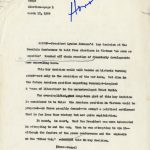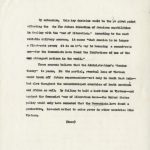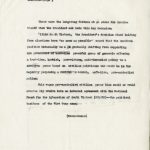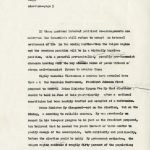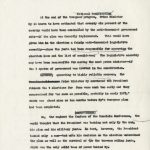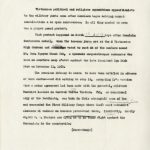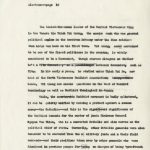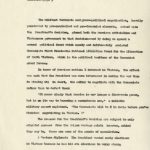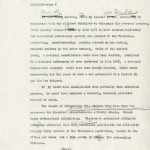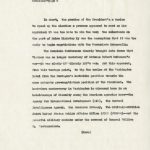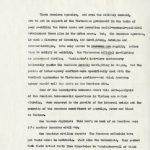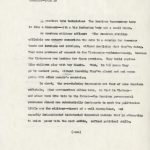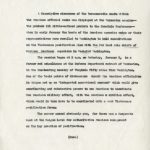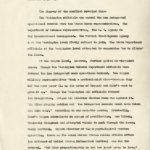1966, March 17, “Hold Free Elections in Vietnam”
deepe
election–page 1
march 17, 1966 Honolulu
SAIGON–President Lyndon Johnson‘s key decision at the Honolulu Conference to hold free elections in Vietnam “as soon as possible” touched off chain reaction of disorderly developments And Buddhist-inspired demonstrations now unraveling here.
This key decision could well become an historic turning point–not only in the evolution of the war here, but also in the future American position regarding Communist-inspired x “wars of liberation” in the underdeveloped Third World.
The oversimplified,gist long-term gist of this key decision is considered to be this: the American position in Vietnam would be prepared–or force possibly forced–to accept a political settlement that is far less than victory but not quite capitulation.
It meant, in short, that the President was more interested in attempting to end the war, than he was attempting to win it–although the fanfare of the press conferences and the emphasis on the “Other War,” submerged[obscured?] this fo key decision.
(More–Deepe)
deepe
election
page 2
By extension, this key decision would be the pv pivot point affecting the the fur future direction of American capabilities in dealing with the “war of liberation.” According to the most reliable military sources, it means “that America is no longer a first-rate power; it is on it’s way to becoming a second-rate one–for the Communists have found the limitations of one of the mos strongest nations in the world.”
These sources believe that the Administration’s “domino theory” is passe, for the partial, eventual loss of Vietnam would touch off future repercussions–not only in South East Asia–but also throughout the underdeveloped countries of South American and Africa as well. By failing to hold a hard-line on Vietnam–and against the Communist “war of liberation here–the United States policy would only have conceded that the Communists have found a productive, low-cost method to seize power [?] in other countries like Vietnam.
(More)
deepe
election–page 3
These were the long-rang factors at sa stake for America itself when the President mak made this key decision.
Within South Vietnam, the President’s decision about holding free elections here “as soon as possible” meant that the American position internally was grd gradually shifting from supporting aye government of hard-line powerful group of generals offering a hard-line, hawkish, pro-victory, anti-Communist policy to a civilian power based on civilian politicans who would be in the majority proposing a dovishm s dovish, soft-line, pro-neutralist policy.
This vague pro-neutralist civilian power bloc could or would eventua lly evolve into an internal agreement with the National Front for the Liberation of South Vietnam (NFLSVN)–the political backbone of the Viet Cong army.–in the coming months or years.
(More–Deepe)
deepe
election–4
Reliable sources here believe there are two ways to negotiate with the Commj Communists. The first is an “around-the-table” conference involving the major countries in the world, such as the 14-nation confe Geneva Conference ending the French- French Indo-China War here in 1954, and dividing Vietnam into a Communist North and an anti-Communist South.
The second way to negotiate is to arrange the inter re-arrange the internal power structure within South Vietnam itself, so that, through a gradual series of maneuvers, intrigues and interim governments an eventual compromise may be reached with the Liberation Front Communist-led Liberation Front. The decision to have elections “as soon as possible” was to attempt toeffect a shift into this type of internal negotiation, reliable sources here believe.
(More–Deepe)
deepe
election–5
If these profound internal political re-arrangements are made–and the Communists still refuse to accept an internal settlement of the in the coming months–then the Saigon regime and the American position will be in a virtually hopeless position, with a powerful pro-neutralist,and possibly covert pro-Communist elements holding down the key elemenx reins of power without a strong anti-Communist forces to counter them.
Highly reliable Vietnamese w sources have revealed here that a t the Honolulu Conference, President Johnson first proposed to General Prime Minister Nguyen Cao Ky that elections for a legislative assembly should be held in June of this year–shortly after a national constitution had been hastily drafted and accepted at a referendum.
Prime Minister Ky disagreed–not on the election, but on the timing, a ccording to reliable sources. Ky was previously on record in his two-year program to do just as the President proposed, but believed that he needed two years instead of three months to pacify enough of the countryside, both militarily and politically, before the election could be held. By government estimates, the Saigon regime currently controls f roughly fifty percent of the population; the Viet Cong control twenty five percent and the remaining twenty five percent are considered cohntested.
(More–Deepe))
deepe
election–6
At the end of the two-year National Pacification program, Prime Minister Ky is known to have estimated that seventy six percent of the country would have been controlled by the anti-Communist government side–if the plan was decently implemented. This would have given him in the election a fairly anti-Communist legislative assembly–since the junta had been responsible for approving the election laws and the list of candidates.and [progression US y?] The legislative assembly maycould have been responsible for naming the next prime minister–if tha t system of government was draftedadopted in the constitution.
However, according to highly reliable sources, the president Johnson, Prime Minister Ky finally convinced the President Johnson tha t elections for June were much too early and they compromised for “as soon as possible, probably in early 1967,” which was about nine or ten months before Ky‘s two-year plan had been completed.
(More–Deepe)
So thr oughout the fanfare of the Honolulu Conference, the world thought that the President was backing not only Ky the man, But Also his plan and his military junta. In fact, however, the President backed only a man–but unde his decision on the election undermined the plan as well as the survival of tye the ten-man ruling junta, which was the only solid base of power behind Ky.
(More–Deepe)
deepe
election–7
No sooner did the Vietnamese delegation arrive back in Saigon onin mid-February ____–along with Vice President Hubert Humphrey–than the word spread like wildfire among the Saigon politicians that “President Johnson wanted to have elections as soon as pooss possible.”
Politically, thi the internal situation had been in a state of dormant ferment; and Vietnamese resentment grew had grown at the way the Honolulu Conference was handled. The “Radio Hanoi” line was that “Ky had gone to Honolulu to report to his American boss.” Because of the short notice here–and the unilateral announcement in Washington about the conference–most Saigonese actually believed the Hanoi version. Historically,In the past, the more closely aligned the American administration has become at embracinged Vietnamese leaders–the more difficult it is for them to survive–for the look thexthey appear t more pro-American than pro-Vietnamese to their highly nationalistic citizenry.
(More–Deepe)
deepe
election–8
Vietnamese political and religious oppositions oppositionists to the military junta soon after Honolulu began holding secret consultations a nd open conferences. Is all they needed to move was a proper prext pretext.
That pretext happened on March 10 (27 days after Honolulu Conference ended), when the ten-man junta met at the J Vietnamese High Command and secretly voted to oust onone of the members named Lt. Gen. Nguyen Chanh Thi, a dynamic ex=paratrooper commander who lead an abortive coup d’etat against the late President Ngo Dinh Diem on November 11, 1960.
The American Embassy is known to have been notified in advance of this ouster–and did nothing to stop it, accepting Ky‘s version that a prior agreement had been made with the powerful, militant Buddhist leaders in Central Veitna Vietnam. Thi, an occasional ally of the Buddhists, was born in their stronghold area of Hue and commanded the First Military Corps where their most extremist Buddhist elements wi weilded ox immense power–and where, ironically, nearly 40,000 U. S. Marines are dying on th in their fighting against the Communists in the countryside.
(More–Deepr)
deepe
election–9
Two days later, the Buddhist leadership at a press conference–while not betryingbetraying Prime Minister Ky by supporting Thi–began an enormous campaign to limit the military weaken the military junta byx and by calling for a “rushing-up” in the process to have am an elected legislative body and l civilian regime “as soon as possible,” as the President, too, had requested.
“In fact, the Buddhists pulled a lulu oj on the President,” according to one highly reliable source. “They took the President’s words of Honolulu–and pinned him to them.”
The Buddhists spearheaded the anti-government drive against the late President No Ngo Dinh Diem in and in November, 1963, with unofficial American backing, toppled him. Since tye then, the Buddhist strength–and suspicious ao about the movement–have grown. ever since.
Especially the Central Vietnam wing of the Buddhists are considered heavily penetrated by Communist agents; some Buddhist anti-Communists estimate that between 50-70 per cent of that wing of the moevement–the most powerful element–is infiltrated by Communist agents or pro-Communist cadre.
(More–Deepe)
deepe
election–10
The behind-the-scene leader of the Central Vietnamese wing is the Venera ble Thich Tri Quang, the anemic monk who was granted political asylum in the American Embassy underduring the Diem crisis–when Lodge was here on his first tour. Tri Quang, accal acclained to be one of the finest politican in the country, is widely considered to be a Communist, though sources disagree on whether he’s a Tito Communist, or a pro-Deistgnmm national Communist, such as Tito. In his early e years, he studied under Thich Tri Do, now head of the North Vietnamese Buddhist Association; today, the hence, Tri Quang can answer questions in the best of Marxist terminology as well as Buddhist theological to terms.language.
While, the countrysideNation[-wide?] Buddhist movement is badly splintered, it can be quickly unified by raising a protest against a common enemy–the Catholics–and this is the significant significance of the Buddhist demands for the ouster of junta Chairman General Nguyen Van Thieu, who is a converted Catholic and also serves as the political chief of state. Currently, other Catholic generals were also demanded to be ousteredd from the mi military junta and a their field commands–and their positions taken over by other generals who were dismissed in previous purges for being on charges of being “pro-French a nd pro-neutralist.”
(More–Deepe)
deepe
election–11
Part of the Buddhist feverish emotionalism about the Catholics is that they are “an imported foreign religion” which was closely identified with the colonial French regime, as well as claimed persecutions about the of the Buddhists by Catholic President Diem. On the other side of the coin, the Catholics in Vietnam are the most anti-Communist Vietnamese element and along with the Vietnamese a rmy and the American army form the three pillars of anti-Communist strength in the country.
Hence, by attacking the Catholics–and soon the Amerivcans–a nd by consistently applying an i-government pressure against muse some of the past regimes, the Buddhis t movement is spcelx directly or indirectly a bbetting the Communist Liberation Front. While the Buddhists demonstrate en masse against the rightists, anti-Communists, they have yet to dom demonstrate against the Communists. While they eagerly discredit the right-wing Catholics, they have yet to discredit in the streets the Communist atheists.
As Buddhist-inspired demonstrations accelerated in tempo aned numbers in the center this week–and are expected to hit Saigon next week–the it is increasing difficult to determine whether the Buddhists a re a legitimate anti-government protest movement, or a second front organization for the Communists, in the same way that the National Liberation Front is the first one. primary one.
(Endit-Deepe)
The Lulu at Honolulu
To Negotiate or To Win?
As a continuing reflection on the events of the Honolulu Conference, the following article explains how the consequences of the conference’s decisions would give more power to the pro-neutralist members of the Vietnam Government, rather than the staunchly anti-Communists
Beverly Deepe
64A Hong Thap Tu
Saigon, Vietnam
Honolulu–page 1
March 26, 1966
THE LULU AT HONOLULU
SAIGON, VIETNAM–Amidst the blamy , homey atmosphere of the Honolulu Conference in early February, President Lyndon B. Johnson waggled his finger at the clusters of American and Vietnamese officials, and said to Prime Minister Nguyen Cao Ky, “we’ll get together in June to see how many coon skins you’ve nailed to the wall.”
Later, one Vietnamese minister semi-facetiously retorted that “perhaps a tiger skin would be more appropriate.”
(More)
deepe
honolulu–page 2
Little did those present realize the enormity of the changes that would engulf Vietnam by June–changes determining whether indeed, Prime Minister Ky would still be in his post, whether his hard-line anti-Communist military junta would still be in position, whether his two-year plan for victory would even have fizzled before it began, and whether a neutralist, pro-Communist government would have seized power which would make the initial step in the evolutionary, eventual process towards an internal negotiation with the Communists–and whether the American military presence would still be accepted or “totally churck chucked out” of Vietnam.byxmxgorsxmxmxmxm
The Honolulu Conference was historic, but for noen none of the reasons cited in its famous Declaration and for none of the statements made in the optomistic press sessions.
The key decision, made secretly and yet to be officially announced, was the desire of President Johnson to hold elections for a Vietnamese legislative assembly “as soon as possible,” instead of in late 1967, as Prime Minister Ky‘s two-year program called for.
This key decision, was the “lulu” of Honolulu, or as one Western diplomat explained, “it should be called the Hollow-lulu Conference–it was a lulu, but it was hollow.” Whether deliberately or inadvertently, the President in his decision effected internally within South Vietnam to toss the decision-making powers of the government into the pro-neutralist elements, rather than the hard-line anti-Communist elements. (More)
deepe
honolulu–page 3
The militant Buddhist- religious-political organization, heavily penetrated by pro-neutralist and pro-Communist elements, seized upon the President’s decision, pinned both the American officialdom and Vietnamese government to that decision–and by doing so opened a second political front which openly and deliberately assisted Communists first front–the National Liberation Front for the Liberation of South Vietnam, which is the political backbone of the Communist armed forces.
“It means simply that America is now longer a first-rate power, but is on its way to becoming a second-rate one,” a reliable military expert explained. “The communists will be 7 in India before you’ve finished negotiating in Vietnam. 2″
The reasons for the President’s decision are subject to only educated guesses from the Saigon vantage point; however, unkind they may be, those are some of the points of speculation.
A Western diplomat: The President wanted early elections in Vietnam because he has his own elections to worry about.
(More)
deepe
honolulu–page 4
A Vietnamese intellecu intellectual: The President’s desire for early elections was simply a maneuver to stuff a towel in the beaks of the American doves to shut them up.
A worried official, who attended the Honolulu Conference: No American had the guts to tell the President he was wrong.
Whatever the reasons, it was clear to political observers here that the President was operating in his traditional two-steps forward, one step backward approach to the problem of Vietnam. The President–and he alone–decided to take the two gigantic strategic steps, both in measured slow-motion, first to bomb North Vietnamese military targets and routes of communication and second to commit American ground troops to the southern republic.
The one backward step, however, was the President’s peace offensive, which although it was admittedly mandatory in terms of international and American public opinion, served to pull the rug out from under the war effort in the South.
Likewise, i at the Honolulu Conference, the President openly declared war on the social, economic and political inadequacies within the South, and attempted to open a second non-military front, which long overdue. He then took the second demonstrative step of dispatching Vice President Hubert tx Humphrey to Vietnam to drive the message home i into the minds of the South Vietnamese people–which only a partial success. But, at Honolulu, he made the one step backward–the attempt to hold elections within the South. This stop opened up the political p andora’s box of unprecedented political intrigue by t the pro-neutralist elements. and covert Communist agents. (More)
deepe
honolulu–page 5
Neither Vietnam nor the anti-Communist war will ever fully recover from that decision.
For, the President, while overwhelmingly embracing Prime Minister Ky–for the whole world to witness–at the Honolulu Conference, then proceeded to pull the rug from under Ky‘s famous two-year program and Ky‘s sole political basis of support in the country–the military junta.
Originally, the President is known to have expes expressed the desire to hold elections for the national legislative assembly in June of this year. High-placed Vietnamese sources indist indicated that Ky talked the President out of that decisionk decision, which would have proved and politically disasterous inx within the South, and in early 1967. While Ky articulated the promise, however, he had little intention of carrying it out–first because he was committed to his two-year program internally and second because he genuinely believed that the pro-neutralist, pro-Communist elements could seize legal power within the country.
(More)
deepe
honolulu–page 6
It was here,Currently, however, that Ky himself is nowwas forced to attempting to compromise with the militant Buddhists to telescope his two-year program, which broadly attempts withed by late 1967 to have secured militarily and controlled politically seventy six percent of the Vietnamese population, simultaneously, pushing forward on his social, economic reforms in the urban centers, while at the central level, a national constitution would have been drafted, submitted to a national referendum of some sort–and by late 1967, a national legislative assembly would have been freely elected, which could conceivably had the power to name a new government to p replace Ky and his War Cabinet.
If Ky could have accomplished even partially this ambitious program, he would have achieved a dramatic, internal political victory of sorts.
The danger of telescoping this program into less than two years–as the President advocated And as the Buddhists later demanded–was a fairly simple, though vague mathematical calculation. Vietnamese government officials currently estimated that they currently controlled politically and militarily roughly fifty percent of the Vietnamese population, mostly in the cities and towns and a thin swathe of villax the surrounding villages.
(More)
deepe
honolulu–page 7
By the end of 1967, the government officials hoped to have expanded their grip on the rural countryside and pushed the Viet Cong Communist military units and political cadre out of the populous valleys and villages. At that time, free elections for a national legislative council could be held–but still the anti-Communist military junta would have indirectly vetoed any known or suspected Communist political agents from running as candidates, although conceivably voters living in Communist-controlled areas would have been granted the right to vote–but only for a non-Communist slate. The ten-man military junta is not only the legal basis of the current government–but ixt also holds the significant position of deciding future governments. But, in the midst of the current Vietnamese political crisis, it is debatable whether the junta in its anti-Communist form and position of power wl will survive.
By speeding up this election procedure, which the President advocated, would have thus proved disasterous in the view of the anti-Communist government.
(More)
deepe
honolulu–page 8
In short, the premise of the President’s x desire to speed up the election r process appeared to rest on his appraisal it was too late to win the war; the reluctance on the part of Prime Minister Ky was the assumption that it was too early to begin negotiations with the Communists internally.
The Honolulu Conference clearly brought into focus that Vietnam was no longer Secretary of Defense Robert McNamara‘s war–it was clarly LB clearly LBJ‘s war. And this appeared, from this vantage point, to tip the scales at the Washington level from the Pentagon‘s hawk-like position towards the more moderate pro-negotiation position of the President. The hawk-dove controversy in Washington is mirrored here in an kaleidoscope of disunity among the American agencies here–the Agency for International Development (AID), the Central Intelligence Agency, the American Embassy, the military-civilian Joint United States Public Affairs Office (JUAP (JUSPAO)–and the powerful military machine under the command of General William C. Westmoreland.
(More)
deepe
honolulu–page 9
These American agencies, and even the military command, are to act in support of the Vietnamese government in the tasks of pacy pacifying the rural areas and promoting social-economic-political development there plus in the urban areas. But the American agencies, in such a disarray of disunity, inf in-fighting, intrigue and counter-intrigue, have only served to prolox man magnify, rather than to nullify or solidify the Vietnamese official in-fighting in government circles. Washington‘s hawk-dove controversy indirectly sparks the American in-ifhg in-fighting in Saigon, but the points of the inter-agency conflict more specifically deal with the tactical approaches to Vietnamese problems–and which American agency should call the shots on the American side.
One Western diplomat: This isn’t so much of an American war; it’s another American civil war.
One American civilian expert: The American officials have put their minds in mothballs. Just like the Communists, they parrot back their latest Party line dispatches to Washington–all of which are based on over-optimism and self-delusion.
(More)
deepe
honolulu–page 10
An American tehn technician: The American bureaucracy here is like a dinosaur–with a big lumbering body and a small brain.
An American military officer: “The American civilian officials are careers careerists who come to a country for two-year tours and intrigue and intrigue, without realizing what they’re doing. They make promises of support to the Vietnamese–subconsciously, because the Vietnamese are looking for these promises. They build empires like children play with toy blocks. Then, in two years they go to another post, without knowing they’ve played cat and mouse games with other people’s countries.
In short, the overwhelming impression and fear of some American officials, plus pro-American allies here, is that in Vietnam–and other wars like this in the future–the American governmental processes abroad are substantially inadequate to meet the political–little own the military–threat of a well disciplined, wel superbly indoctrinated dictatorial Communist machine that is attempting to seize power with the most subtle, refined political skills.
(More)
deepe
honolulu–page 11
A descriptive microcosm of the bureaucratic snafu within the American official ranks was displayed at the Warrenton session–the prelude ill little-noticed prelude to the Honolulu Conference–when in early January the heads of the American agencies and or their representatives were recalled to Washington to hold consultations on the Vietnamese pacification plan with the Far East Asia chiefs of various American superiors in Washgint Washington.
The session began at 9 a.m. on Saturday, January 9, in a former red schoolhouse at the Defense Department retreat of Warrenton, in the fox-hunting country of Virginia fifty miles from Washington. One of the basic points of discussion: should the American officialdom in Saigon set up an “integrated operational command” which would give coordinating and substantive powers to one American to coordinate the American military effort, with the American m civilian effort, which would in turn have to be coordinated with a weak Vietnamese pacification force.
The answer seemed obviously yes, since there was a desperate need at the Saigon level for authoritative American management on the key question of pacification.
(More)
deepe
honolulu–page 12
But, then the classical American inter-agency conflict arose–would the American military or the American civilians run the effort? Underlying this question was the basic tactical approach to running the war–and whether the eventual American policy was to negotiate or to win.
One American argued, “We may be a relatively short distance away from some sort of negotiation. In the course or aftermate aftermath we may have to less[en?] our military presence–and it will be easier to maintain a non-combattant civilian presence. Hence, the pacification effort should, for example, stress civilia American civilian police advisors to assist the Vietnamese police rater rather than American military advir advisors to the Vietnamese paramilitary units. This is debated all the time within American official circles. Hence, if wr we develop pacification on the civilian side, the Americans can maintain their strength in Vietnam longer than under a military establishment. This a is an important fundamental.”
But, against this background, one the discussion started, differences of opinion and approach began to emerge. The meeting was conducted under the co-chairmanship of Saigon‘s deputy ambassador William Porter and Leonard Unger, former ambassador to Laos and head of the Vietnam Coordinating Council in Washington.
(More)
deepe
honolulu–page 13
The line-up of the conflict revealed this:
The Washington officials who wanted the ine integrated operational command were the White House representatives, the Department of the Defense representatives, the U. S. Agency fo for International Development. The Central Intelligence Agency t at the Washington level flatly refused to join. The State Department officials at the Washington level attempted to compromise “or to dilute” the issue.
At the Saigon level, however, further splits in viewpoint arose. Though the Washington Defense Department officials were favored the ine integrated comm operational command, the Saigon military representatives “took a protectionist view–because they had the most power (i. e. the power of troops) and didn’t want to give it up.” Though the Washington AID officials favored ine integration, Saigon AID Director Charles Mann was against it. “He likes playing soldier and the integrated command would have taken his toys away,” according to one reliable source. Ironically, Mann‘s Saigon subordinate in charge of pacification, Sam Wilson, violently disagreed and attempted vainly to push through the issue. Barry Zorthian, Saigon director of the o psychological warfare operation, known as the Joint United States Public Affairs Office (an offshoot of the United States Information Service) was for the command, “but then proportionately he had the least power to lose.” The American Embassy officials in S from Saigon, including co-chairman Porter, sided with the State Department superiors and “diluted the whole issue.” (More)
deepe
honolulu–page 14
Saigon CIA officials sided with their Washington CIA superiors and refused to join the integrated operational command.
“The co-ahri co-chairmen were always moving on to another topic, while the pro-inetr pro-integrationists tried to push on with the discussion,” according to one reliable source. “In the end, they flicked at the issue like brushing against a hot stove. They were all too politi polite to each other when e they should have had a pushing, shoving showdown.”
After two and a half days of discussion, the key decision[?] was shelved.
These basic dev divisions are now being s reflected 15,000 miles away in remote Vietnamese divisionsvillages. [?] The basic CIA position in Washington, the CIA representatives int he northern provinces of Vietnam, responsible for training helping to train the important Vietnamese pacification cadre, refuse to sit on a Vietnamese-American council with the U. S. Marines. These northern provinces, known as the first Vietnamese military corps, are currently the scene of a disorderly public rebellion in the urban rear base areas were[with?] 40,000 American Marinres Marines–yet the American Embassy in Saigon doesn’t[won’t?] bother to inform the Marinr Marines of the key decisions political decision that their Vietnamese commanding general had been removed from his post in to their area.
deepe
honolulu–page 15
A month later, the Honl Honolulu Conference was held. The decision was finally made–no integrated c operational center. But deputy ambassador Porter, who ironically had skirted the issue at the Warrenton session, was named to the “special post” of coordinating “all aspects of the work of the united States in Vietnamese government projects…to implement the pacification program advocated at Honll Honolulu.” But, the appointment authorized too little power much to late in the game.
Less than a month after Honolulu, Vietnam was engulfed in an unprecedented political crisis awesomely displaying the Communist subversion on the one hand plus latent anti-Americaniam on the other hand. In xxx the face of this rising political threat, the Vietnamese government, even with all the image-making of Honolulu, was too weak to govern; the American officials in Washington and Saigon were too confused to lead. The anti-Communist, American position in Vietnam was gradually sliding into one of either camouflaged retreat through negotiations or total humiliating defeat. While victory is still possible, but it is forgotten. For the Honolulu Conference was the historic prelude to the Final American Snafu in Vietna m.
-30-
Read Previous Article: 1966, January 18, “The Red Noose”
Read Next Article: 1966, August 12, “Two Friends, Both Sergeants”

